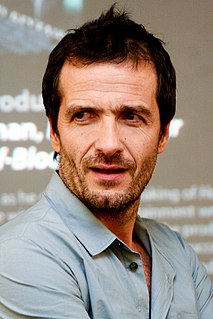A Quote by Jens Martin Skibsted
Looking at the numbers, the transatlantic slave trade matches the Holocaust in horror - maybe even without counting subsidiary effects like internal strife and deaths inflected on the continent, death during transport, death during ownership, collapse of African economies, and such.
Related Quotes
Birth leads to death, death precedes birth. So if you want to see life as it really is, it is rounded on both the sides by death. Death is the beginning and death is again the end, and life is just the illusion in between. You feel alive between two deaths; the passage joining one death to another you call life. Buddha says this is not life. This life is dukkha - misery. This life is death.
Looking at suicide—the sheer numbers, the pain leading up to it, and the suffering left behind—is harrowing. For every moment of exuberance in the science, or in the success of governments, there is a matching and terrible reality of the deaths themselves: the young deaths, the violent deaths, the unnecessary deaths
Decades from now, people will look back and wonder how societies could have acquiesced in a sex slave trade in the twenty-first century that is... bigger than the transatlantic slave trade was in the nineteenth. They will be perplexed that we shrugged as a lack of investment in maternal health caused half a million women to perish in childbirth each year.
As deaths have accumulated I have begun to think of life and death as a set of balance scales. When one is young, the scale is heavily tipped toward the living. With the first death, the first consciousness of death, the counter scale begins to fall. Death by death, the scales shift weight until what was unthinkable becomes merely a matter of gravity and the fall into death becomes an easy step.
I yearn for the darkness. I pray for death. Real death. If I thought that in death I would meet the people I've known in life I don't know what I'd do. That would be the ultimate horror. The ultimate despair. If I had to meet my mother again and start all of that all over, only this time without the prospect of death to look forward to? Well. That would be the final nightmare. Kafka on wheels.
Someone's killed 100,000 people. We're almost going, "Well done! You killed 100,000 people? You must get up very early in the morning! I can't even get down the gym. Your diary must look odd: 'Get up in the morning, death, death, death, death, death, death, death - lunch - death, death, death - afternoon tea - death, death, death - quick shower ...' "
The truth is, it's very hard looking back... we look at holocaust now with such knowledge and such a sense of the horror of what it was, that it's hard to believe even now that in 1930s and 1940s, before something like this had happened, that it could be impossible to imagine the extent of this horror.
We are left with nothing but death, the irreducible fact of our own mortality. Death after a long illness we can accept with resignation. Even accidental death we can ascribe to fate. But for a man to die of no apparent cause, for a man to die simply because he is a man, brings us so close to the invisible boundary between life and death that we no longer know which side we are on. Life becomes death, and it is as if this death has owned this life all along. Death without warning. Which is to say: life stops. And it can stop at any moment.







































